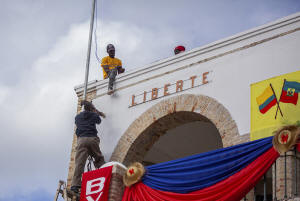Haitians demand priority after government spends $3.8M for a brief visit
from Colombia's leader
 Send a link to a friend
Send a link to a friend
 [January 24, 2025]
By EVENS SANON [January 24, 2025]
By EVENS SANON
PORT-AU-PRINCE, Haiti (AP) — The money materialized as soon as
Colombia’s president confirmed his visit to southern Haiti.
The Haitian government invested more than $3.8 million to more than
double the runway at the airport in the coastal city of Jacmel, repair
its streets, renovate its town hall and restore electricity to a
population living in the dark for at least three years.
The speed at which the money materialized and crews overhauled the city
left many Haitians stunned in a country whose infrastructure is
crumbling and where gang violence has displaced more than one million
people.
“The government doesn’t have money to remove us from the camp or provide
security in the country, but it does have 500 million gourdes to spend
on itself for a couple of days?” wondered Antoine Jean-Baptiste.
The 44-year-old unemployed electrician lives in a makeshift shelter like
thousands of other Haitians in the capital of Port-au-Prince after gangs
razed their neighborhoods.
He questioned how much the government spent to fly to Jacmel since
driving there is too dangerous because gangs control the main roads
leading in and out of Port-au-Prince.
“They can’t pay teachers. Hospitals are closed. Was it necessary to
spend all that money for a president that was visiting?” Baptiste asked.
On Wednesday evening, Colombian President Gustavo Petro landed on the
extended runway and was greeted with a red carpet, armed soldiers and
dozens of small Colombian flags flying above the streets that he
traveled through to meet with Haitian officials at an upscale hotel.

His visit lasted about four hours.
Alfred Métellus, Haiti’s new minister of economy and finance, said the
extended runway would help boost Jacmel’s economy as he announced the
investment during a press conference on Tuesday.
He said Jacmel’s prison also is being renovated, and that customers are
returning to hotels in an area that once thrived with tourists.
“About a week ago, there was zero activity,” he said. “We see there’s a
possibility to make Haiti rise again.”
But those living in Port-au-Prince and other cities and towns wonder
when it’s their turn to see an investment, and why Haitians aren’t a
priority.
[to top of second column]
|

Workers hang decorations for a welcoming ceremony for Colombian
President Gustavo Petro, in Jacmel, Haiti, Wednesday, Jan. 22, 2025.
(AP Photo/Patrice Noel)

“The 500 million gourdes could have been useful for providing security,
reinforcing the army and recruiting more young, devoted Haitians to
serve the country, not for a lousy visit of a president that has his own
problems,” said Mario Jean-Pierre, 40, who lives in a makeshift shelter
after losing his home to gangs. “Our kids can’t go to school, we’re not
working, families can’t eat and we’re not getting basic necessities to
survive here.”
In Jacmel, some celebrated the investment with caution, especially the
return of electricity.
Wood-jerry Gabriel, a multimedia journalist who lives in Jacmel, said
residents had been without power for three to five years, and that not
everyone saw their electricity restored.
He said roads also were paved, the town hall painted and a nearby park
decorated and cleaned.
“It was just showbusiness,” he said. “I’m not confident it’s going to
last.”
Some also noted that not everyone in Jacmel benefitted from the
investment.
Former local legislator Wilner Content told Le Nouvelliste newspaper
that the city’s cleaning staff have not been paid for months.
“What kind of government is this?” said Jean-Baptiste, who used to work
in downtown Port-au-Prince until his company shut down because of
violence. “They can’t even take care of their own people, but they want
to look good in front of other governments.”
Jean-Pierre echoed that anger.
He used to drive a small colorful bus known as a tap-tap, but the owner
of it fled for the Dominican Republic to escape gang violence and he was
left without a job.
Jean-Pierre questioned when things would change for him and other
Haitians struggling to live in a country where more than 5,600 people
were killed last year.
“Can’t wait for something real to happen,” he said.
___
Associated Press reporter Dánica Coto in San Juan, Puerto Rico
contributed.
All contents © copyright 2025 Associated Press. All rights reserved |